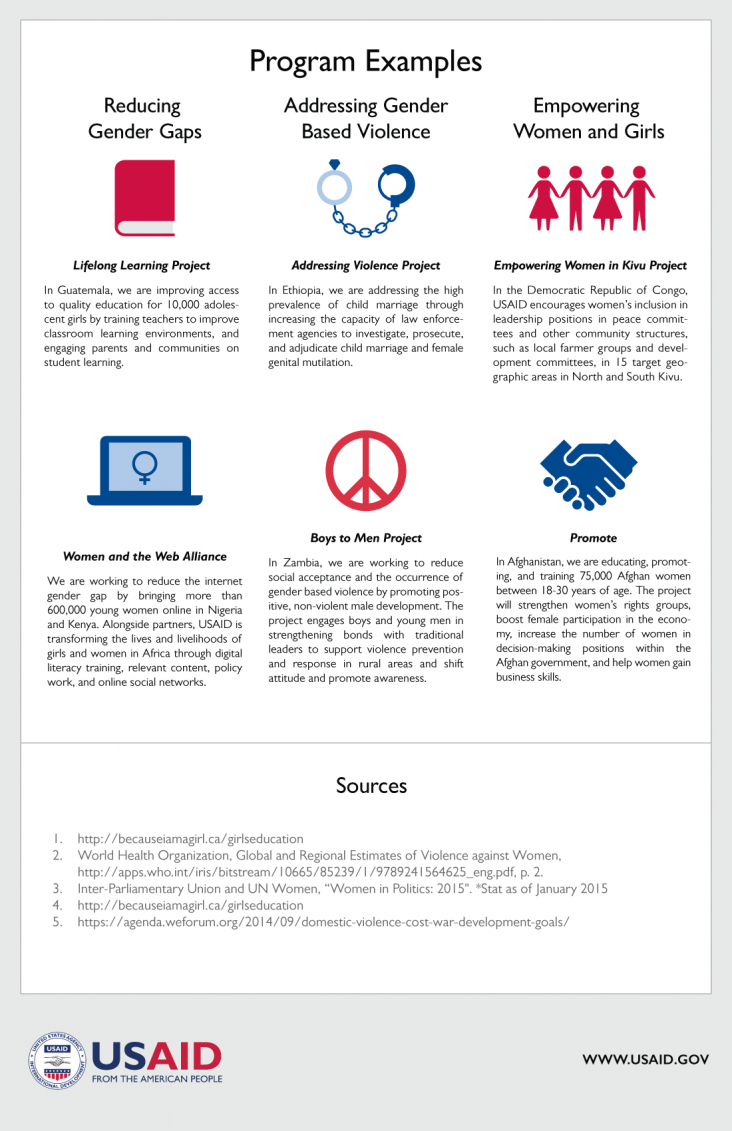

At USAID, we believe that gender equality and women’s empowerment are not just a part of development but at the core of development. Women and girls have tremendous, and often untapped, power to contribute to the advancement of their communities and countries. However, women and girls lack access to resources and opportunities; they often face stigma and violence; and are unable to realize their full potential. That’s why throughout our programs in over 80 countries, we’re closing gender gaps, reducing gender-based violence, and empowering women and girls.
Gender Equality = Smarter Development Infographic ![]() (pdf - 821k)
(pdf - 821k)
USAID Gender Goals
- Reduce Gender Gaps
- Address Gender-Based Violence
- Empower Women and Girls
The Problem
Around the world 62 million girls are not in school. 1
Globally, 1 in 3 women will experience gender-based violence in her lifetime. 2
Only 22 percent of all national parliamentarians are female. 3
The Potential
Investing in women and girls can unlock human potential on a transformational scale
For every extra year a girl stays in school, her income can increase by 15 to 25% 4
5.2% of global GDP could be added to the world economy if domestic violence was stopped. 5
Women’s leadership is strongly linked to positive developments in education, infrastructure and health standards at the local and global level.
Program Examples
Reducing Gender Gaps
Lifelong Learning Project
In Guatemala, we are improving access to quality education for 10,000 adolescent girls by training teachers to improve classroom learning environments, and engaging parents and communities on student learning.
Women and the Web Alliance
We are working to reduce the internet gender gap by bringing more than 600,000 young women online in Nigeria and Kenya. Alongside partners, USAID is transforming the lives and livelihoods of girls and women in Africa through digital literacy training, relevant content, policy work, and online social networks.
Addressing Gender Based Violence
Addressing Violence Project
In Ethiopia, we are addressing the high prevalence of child marriage through increasing the capacity of law enforcement agencies to investigate, prosecute, and adjudicate child marriage and female genital mutilation.
Boys to Men Project
In Zambia, we are working to reduce social acceptance and the occurrence of gender based violence by promoting positive, non-violent male development. The project engages boys and young men in strengthening bonds with traditional leaders to support violence prevention and response in rural areas and shift attitude and promote awareness.
Empowering Women and Girls
Empowering Women in Kivu Project
In the Democratic Republic of Congo, USAID encourages women’s inclusion in leadership positions in peace committees and other community structures, such as local farmer groups and development committees, in 15 target geographic areas in North and South Kivu.
Promote
In Afghanistan, we are educating, promoting, and training 75,000 Afghan women between 18-30 years of age. The project will strengthen women’s rights groups, boost female participation in the economy, increase the number of women in decision-making positions within the Afghan government, and help women gain business skills.
Sources
http://becauseiamagirl.ca/girlseducation
World Health Organization, Global and Regional Estimates of Violence against Women, http://apps.who.int/iris/bitstream/10665/85239/1/9789241564625_eng.pdf, p. 2.
Inter-Parliamentary Union and UN Women, “Women in Politics: 2015". *Stat as of January 2015
http://becauseiamagirl.ca/girlseducation
https://agenda.weforum.org/2014/09/domestic-violence-cost-war-developmen...








Comment
Make a general inquiry or suggest an improvement.